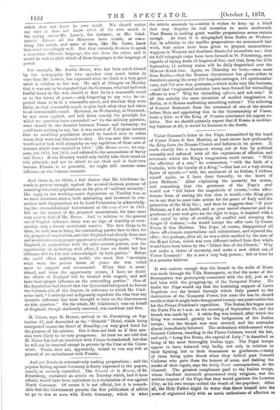For example, Mr. Austin Bruce, who has been much abused
by the newspapers for two speeches very much better in tone than Mr. Lowe's, has expressed what we think is a very good mind in relation to the war. lie said at Glasgow on Monday that it was not to be expected that the Germans, who had had such fearful losses in the war, should at first be in a reasonable mood as to the terms of peace,—only forgetting to say when he ex- pected them to be in a reasonable mood, and whether they were likely, in that reasonable mood, to give back what they had taken in an unreasonable mood. However, on Wednesday, at Greenock, he was more explicit, and laid down exactly the principle for which we ourselves have contended :—" To the military question, what should be the frontier between France and Germany, we could have nothing to say, but it was matter of European interest that no unwilling population should be handed over to rulers whom they were not disposed to obey. He was sure this country would never look with sympathy on any repetition of those acts of violence which were enacted in 1858." (Mr. Bruce meant, we sup- pose, not 1858, but 1859, and referred to the annexations of Savoy and Nice.) If the Ministry would only boldly take their stand on this principle, and not be afraid to say their soul is their own because Prussia is so powerful, we might still exercise some influence on the German counsels.






























 Previous page
Previous page